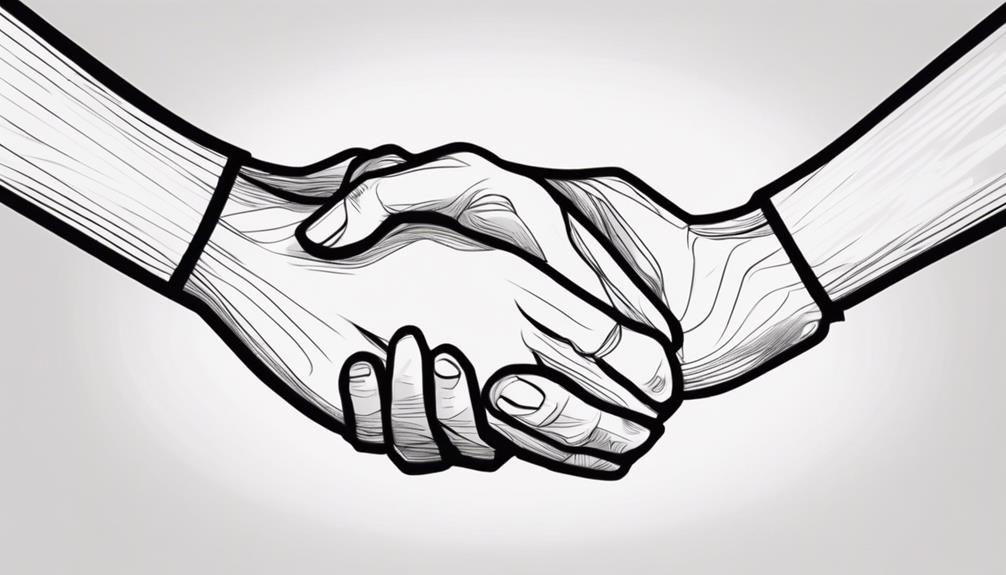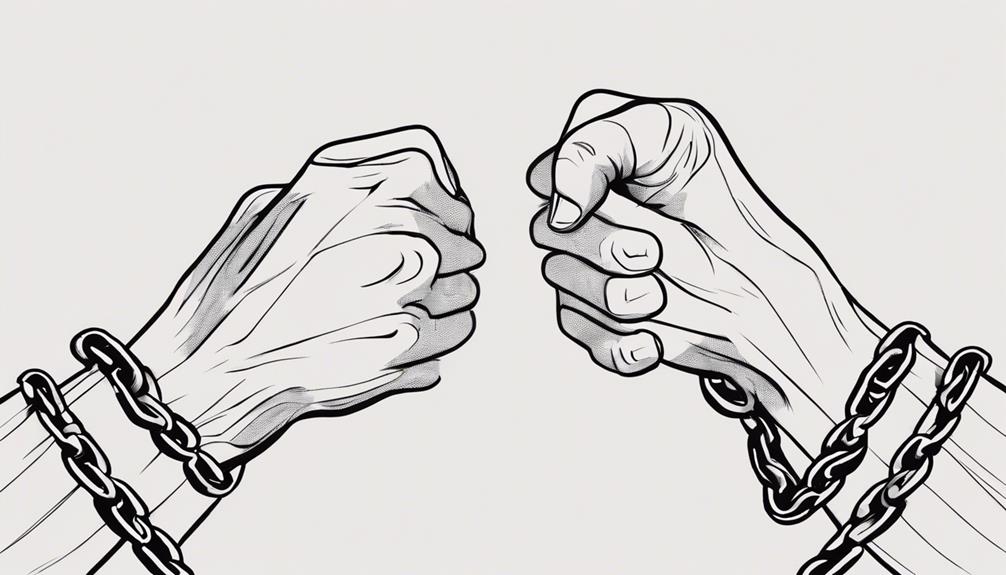The power of forgiveness is a multifaceted phenomenon that transcends mere interpersonal dynamics. It delves into the intricate workings of the human psyche, offering insights into the complexities of emotional regulation and social cohesion. By exploring the nuances of forgiveness, we can uncover its transformative potential in fostering resilience, empathy, and personal growth. This discussion will delve into the psychological and societal implications of forgiveness, shedding light on its profound impact on individuals and communities.
Key Takeaways
- Forgiveness promotes emotional well-being and peace.
- Choosing to forgive nurtures empathy, compassion, and healthier relationships.
- Forgiveness correlates with greater life satisfaction and improved mental health.
- Forgiveness in relationships strengthens trust, reduces conflicts, and enhances communication.
Understanding Forgiveness

Forgiveness is a deliberate and transformative process that involves releasing feelings of resentment and anger towards individuals who have caused harm. When individuals choose to forgive, they consciously decide to let go of negative emotions, allowing themselves to move past the hurtful actions that have been inflicted upon them. This act of forgiveness is not synonymous with forgetting or excusing the harm done; rather, it is a conscious effort to free oneself from the emotional burden of anger and resentment.
From a mental health perspective, forgiveness plays a crucial role in promoting emotional well-being. By releasing feelings of animosity towards those who have wronged them, individuals can experience a sense of liberation and peace. This process can lead to improved self-esteem, reduced stress levels, and enhanced emotional stability. Moreover, forgiveness nurtures empathy, compassion, and understanding, fostering healthier relationships and promoting overall psychological health. Embracing forgiveness can contribute to a sense of inner peace, self-compassion, and higher self-esteem, ultimately benefiting one's mental health and well-being.
Psychological Benefits of Forgiving
Understanding the psychological benefits associated with letting go of resentment and anger towards those who have caused harm sheds light on the transformative power of forgiveness in promoting mental well-being. Forgiveness has been extensively linked to improved mental health and well-being. Research suggests that individuals who choose to forgive often experience lower levels of depression, anxiety, and hostility, leading to better overall mental health. Moreover, those who practice forgiveness tend to have reduced substance abuse issues and higher self-esteem levels, contributing further to their well-being. Studies also indicate that forgiveness is correlated with greater life satisfaction, highlighting its positive impact on mental wellness. Furthermore, forgiveness has been associated with physical health benefits such as lower blood pressure and improved immune function. While the decision to forgive may be challenging, the psychological advantages it offers in terms of mental health improvement make it a valuable practice.
| Psychological Benefits of Forgiving | |
|---|---|
| Lower levels of depression | |
| Reduced anxiety and hostility | |
| Enhanced self-esteem |
Grudge-Holding Dynamics

Grudge-holding dynamics are characterized by the persistence of negative emotions and resentment towards individuals who have caused harm or offense. When individuals hold grudges, they harbor feelings of anger, bitterness, and resentment, which can have detrimental effects on their mental and emotional well-being. These negative feelings not only impact the individuals holding the grudges but can also seep into their present experiences and relationships, preventing them from fully engaging and enjoying life.
Research indicates that holding onto grudges can lead to increased levels of depression, anxiety, and irritability. Moreover, these grudges can create conflicts with one's spiritual beliefs and hinder valuable connections with others. By understanding the dynamics of grudge-holding and the associated negative emotions, individuals can begin to appreciate the importance of forgiveness in releasing these burdens. Letting go of grudges through forgiveness can pave the way for improved mental and emotional health, ultimately leading to a more fulfilling and positive outlook on life.
Negative Impact of Grudges
Holding onto grudges can have detrimental effects on both mental and emotional well-being. The negative impact of grudges extends to harming relationships and fostering feelings of resentment. Understanding the consequences of holding onto grudges is crucial for promoting overall psychological health.
Grudges Harm Relationships
The detrimental effects of harboring grudges within relationships are evident through the increased anger and bitterness that often ensue. Holding onto grudges can have a significant negative impact on relationships, hindering the ability to trust and connect with others on a deeper level. This, in turn, creates barriers to effective communication and understanding between individuals. The consequences of maintaining grudges go beyond just the initial hurt caused; they can prevent personal growth and emotional healing, leading to long-lasting repercussions in relationships.
- Trust and connection are compromised.
- Communication barriers arise.
- Personal growth and emotional healing are hindered.
Grudges Lead to Resentment
The accumulation of unresolved grievances can precipitate a cascade of negative emotions, leading to deep-seated resentment within individuals. Holding onto grudges not only affects relationships but also significantly impacts mental health. Resentment, a common byproduct of harboring grudges, can have detrimental effects on one's well-being. It often manifests as increased stress, anxiety, and even depression, further highlighting the importance of addressing and resolving grievances. This negative emotional state can hinder an individual's ability to form and maintain healthy relationships, creating a barrier to genuine connections. Moreover, dwelling on past grievances prevents individuals from fully engaging in the present moment, hindering personal growth and emotional healing. Letting go of grudges is crucial for promoting mental health and fostering positive interactions with others.
| Negative Impact of Grudges | |
|---|---|
| Increased Resentment | Bitterness towards others |
| Mental Health Effects | Stress, anxiety, depression |
| Relationship Hindrance | Difficulty forming positive connections |
Steps Towards Forgiveness

To embark on the journey of forgiveness, individuals must first acknowledge the significance of releasing resentments and anger for their well-being. Identifying the root of the pain and actively working towards forgiving the offender are crucial initial steps in the process. Seeking external support from groups or professionals can aid in navigating the complexities of emotions and ultimately choosing to forgive.
Benefits of Forgiveness
Initiating the process of forgiveness can significantly enhance emotional well-being and interpersonal connections. Forgiveness not only benefits mental health but also has a positive impact on physical health. Some benefits of forgiveness include:
- Improved mental health by reducing stress and anxiety levels.
- Enhanced physical health through lower blood pressure and improved heart health.
- Strengthened relationships by promoting trust, empathy, and communication.
These benefits highlight the importance of forgiveness in promoting overall well-being and fostering healthier connections with oneself and others. By acknowledging the value of forgiveness and actively engaging in the process, individuals can experience profound positive effects on their health and relationships.
Healing Through Forgiveness
Embarking on the journey of healing through forgiveness entails a deliberate and introspective process that can lead to profound emotional transformation and personal development. Recognizing the value of forgiveness is crucial for this journey as it can pave the way for emotional healing and personal growth. Seeking support from groups or counselors can provide valuable assistance in navigating the complexities of forgiveness. Acknowledging and releasing pent-up emotions is a vital step towards letting go of resentment. Choosing to forgive and relinquishing control from the offender can bring a sense of peace and freedom. Ultimately, healing through forgiveness can foster healthier relationships and contribute to improved mental well-being.
| Healing Through Forgiveness | Value of Forgiveness |
|---|---|
| Emotional transformation | Personal growth |
| Seeking support | Letting go of resentment |
| Acknowledging emotions | Peace and freedom |
| Choosing to forgive | Healthier relationships |
| Improved mental well-being |
Letting Go and Moving On
Letting go of resentment and embracing personal growth through forgiveness is a deliberate and transformative process that fosters emotional healing and well-being. Forgiveness involves intentionally releasing negative emotions towards the offender and shifting focus towards self-improvement. This process allows individuals to free themselves from the burden of past hurt, leading to inner peace and tranquility. By choosing to forgive, individuals relinquish the power the offender holds over them, enabling them to move forward with a sense of liberation and closure. Seeking support from loved ones or professionals and acknowledging one's own emotions are crucial steps in the journey towards healing and forgiveness.
- Forgiveness entails releasing resentment and anger towards the offender.
- It enables individuals to focus on personal growth and well-being.
- Seeking support and acknowledging emotions are essential for the forgiveness process.
Consequences of Unforgiveness

Unforgiveness manifests detrimental effects on both mental and physical well-being, contributing to heightened stress levels, compromised immune function, and strained interpersonal relationships. Research indicates that holding onto grudges and harboring feelings of unforgiveness can lead to increased stress, anxiety, and depression. The act of not forgiving can also have tangible effects on physical health, such as raising blood pressure and weakening the immune system. Furthermore, unforgiveness is linked to higher levels of hostility and lower self-esteem, which can strain relationships and hinder personal growth and overall well-being.
Moreover, the cycle of negative emotions and thoughts perpetuated by unforgiveness can significantly impact an individual's quality of life. It can create barriers to meaningful connections with others and impede the ability to move forward from past grievances. Recognizing the consequences of unforgiveness underscores the importance of cultivating forgiveness as a tool for promoting mental and physical health, fostering resilience, and nurturing positive relationships.
Forgiveness Vs. Reconciliation
Forgiveness and reconciliation represent distinct processes in addressing interpersonal conflicts, each with its own unique implications for individuals and relationships.
- Forgiveness focuses on letting go of negative emotions towards the wrongdoer, promoting personal healing and growth.
- Reconciliation involves rebuilding trust and communication to mend a broken relationship, requiring effort from both parties.
- Understanding the disparity between forgiveness and reconciliation is crucial for prioritizing mental and emotional well-being in complex relationship dynamics.
Forgiveness can offer inner peace and closure, benefiting one's mental health, even without the need for reconciliation. On the other hand, reconciliation aims at restoring the relationship, which may not always be feasible or advisable. By discerning between forgiveness and reconciliation, individuals can make informed decisions that promote their emotional well-being and facilitate personal growth. It is essential to recognize that forgiveness and reconciliation serve different purposes, and choosing the path that aligns with one's values and mental health needs is paramount.
Dealing With Unchanged Behavior

When faced with persistent unchanged behavior following forgiveness, establishing clear boundaries becomes imperative in preventing further harm and maintaining personal integrity. It is crucial to communicate expectations and consequences for repeated offenses. Seeking support from counselors or support groups can provide guidance on dealing with unchanged behavior. Understanding that forgiveness does not always equate to reconciliation is essential when behavior remains unchanged. Holding onto forgiveness while upholding self-respect is paramount when facing persistent negative behavior.
| Key Points | Description | Importance |
|---|---|---|
| Set Clear Boundaries | Clearly communicate expectations and consequences for repeated offenses | Prevent Further Harm |
| Seek Support | Counselors and support groups offer guidance on addressing persistent unchanged behavior | Guidance |
| Understand Forgiveness | Knowing forgiveness doesn't always lead to reconciliation is crucial when behavior persists | Clarity |
Seeking Forgiveness for Yourself
Seeking forgiveness for yourself involves a process of self-reflection and accountability. By acknowledging one's mistakes and demonstrating genuine remorse, individuals can pave the way for personal growth and healing. This journey towards seeking forgiveness can lead to inner peace and a deeper sense of self-acceptance.
Inner Peace Through Forgiveness
Taking responsibility for one's mistakes is a crucial step towards achieving inner peace and emotional healing through self-forgiveness. Seeking forgiveness for yourself involves acknowledging your errors and accepting accountability for your behavior. This process can lead to a sense of peace and well-being by letting go of negative emotions and self-blame. To promote inner peace through forgiveness, consider the following:
- Acknowledge your mistakes without judgment.
- Practice self-compassion and kindness towards yourself.
- Focus on personal growth and learning from past experiences.
Self-Acceptance and Growth
Self-acceptance and growth through the process of seeking forgiveness for oneself play a pivotal role in fostering emotional resilience and promoting inner well-being. Self-acceptance involves acknowledging mistakes and embracing personal growth, while self-forgiveness promotes self-compassion and inner peace. By letting go of self-blame and guilt, individuals pave the way for emotional healing and resilience. This process also leads to increased self-esteem and reduced self-criticism. Embracing self-forgiveness is a vital step towards overall well-being and mental health. It allows individuals to cultivate a more positive self-image, learn from past experiences, and move forward with a sense of inner peace and acceptance. Self-acceptance and self-forgiveness are essential components of personal growth and emotional well-being.
Healing Emotional Wounds
Building upon the foundation of self-acceptance and personal growth, the process of seeking forgiveness for oneself plays a crucial role in the journey towards healing emotional wounds and cultivating inner peace. Acknowledging and forgiving one's own mistakes can help release the burden of guilt and shame, leading to emotional healing. Self-forgiveness is associated with improved mental health outcomes, such as reduced symptoms of depression and anxiety. Letting go of self-blame through forgiveness can foster self-compassion and enhance self-esteem, contributing to overall well-being. Healing emotional wounds through self-forgiveness not only promotes personal growth but also builds resilience, enabling individuals to navigate life's challenges with a greater sense of inner peace and emotional stability.
Healing Relationships Through Forgiveness
Forgiveness serves as a potent tool for repairing and enhancing relationships, fostering healing and understanding between individuals. When individuals choose to forgive, they open the door to emotional healing and pave the way for rebuilding connections that may have been strained or broken. Studies emphasize that forgiveness reduces conflicts and promotes better communication, leading to increased trust and overall relationship satisfaction. By letting go of past grievances and focusing on the present, individuals can create a more positive relationship dynamic and cultivate empathy towards others.
| Benefits of Forgiveness in Healing Relationships | |
|---|---|
| Reduction in conflicts | Better communication |
| Increased trust | Improved relationship satisfaction |
| Emotional healing | Rebuilding broken connections |
Research indicates that practicing forgiveness can strengthen bonds and increase intimacy between individuals. By fostering forgiveness, individuals can experience long-lasting and fulfilling relationships built on understanding and empathy.
Power of Forgiveness in Practice

Forgiveness, when put into practice, demonstrates a profound impact on individuals' overall well-being and physiological health. It is not merely a passive act but an active choice that can yield significant benefits. When individuals choose to forgive, they might experience the following:
- Reduced Stress and Anxiety: Forgiveness can alleviate the psychological burden of holding onto grudges, leading to decreased stress levels and lower anxiety.
- Enhanced Physical Health: Choosing to forgive is like an altruistic gift to oneself, as it might lower blood pressure, strengthen the immune system, and improve heart health.
- Promotion of Personal Growth: Forgiveness allows individuals to let go of negative emotions, freeing up mental space to focus on personal development and moving forward positively in life.
Impact of Forgiveness on Relationships
The practice of forgiveness within relationships has been shown to profoundly influence the dynamics and outcomes of interpersonal interactions. Forgiveness is an altruistic act that can have a significant impact on both the person extending forgiveness and the situation at hand. Research indicates that forgiveness in relationships leads to increased trust, intimacy, and satisfaction among individuals involved. It plays a crucial role in reducing conflicts, promoting effective communication, and fostering understanding between parties. Additionally, forgiveness helps in the process of rebuilding broken relationships, ultimately strengthening and prolonging the bonds shared between individuals. Furthermore, individuals who incorporate forgiveness into their relationships tend to exhibit higher levels of empathy and compassion towards others. To illustrate the multifaceted impact of forgiveness in relationships, the following table highlights its various effects:
| Effects of Forgiveness in Relationships | |
|---|---|
| Increased trust and intimacy | Reduced conflict |
| Enhanced communication and understanding | Relationship repair |
| Higher satisfaction levels | Empathy development |
Frequently Asked Questions
What Is the Power of Forgiveness According to the Bible?
From a biblical perspective, forgiveness holds transformative power. It is a cornerstone of spiritual healing, enabling individuals to release resentment and embrace mercy. Through forgiveness, relationships are restored, peace is fostered, and God's grace is exemplified. The act of forgiving mirrors divine forgiveness towards humanity, emphasizing the importance of extending the same grace to others. Ultimately, forgiveness in the Bible is a catalyst for healing, reconciliation, and spiritual growth within individuals and communities.
Why Is Forgiveness so Powerful?
Forgiveness holds immense power due to its ability to promote healing in relationships and provide emotional freedom. By letting go of resentment and anger, individuals can experience emotional liberation, paving the way for healthier connections with others. This process of forgiveness enables individuals to release negative emotions, fostering personal growth and inner peace. Scientifically, forgiveness has been linked to improved mental well-being and overall life satisfaction, emphasizing its importance in psychological and emotional health.
What Are 3 Benefits of Forgiveness?
Forgiveness offers profound benefits for healing, relationships, and mental health. It fosters inner peace by releasing resentment and promoting emotional well-being. Scientifically, forgiveness is linked to reduced stress, improved mood, and enhanced psychological resilience. By letting go of grudges and embracing forgiveness, individuals can experience transformative changes in their lives, creating a positive ripple effect that extends to their overall well-being and interactions with others.
Is There Power in Forgiveness?
Forgiveness holds significant power in the healing process and mental health. Research indicates that choosing to forgive can alleviate emotional burdens and foster psychological well-being. By releasing negative emotions and promoting inner peace, forgiveness plays a vital role in enhancing mental health outcomes. Its ability to facilitate emotional healing and restore mental equilibrium underscores the transformative power forgiveness holds in contributing to overall well-being.
Conclusion
In conclusion, the power of forgiveness is a transformative process that promotes inner peace, compassion, and overall well-being. By choosing to forgive, individuals can release themselves from the burdens of resentment and anger, leading to healing and growth. Forgiveness has the potential to improve mental and emotional well-being, resulting in healthier relationships and a more fulfilling life. The impact of forgiveness on individuals and communities is profound, showcasing its ability to bring about positive change.
